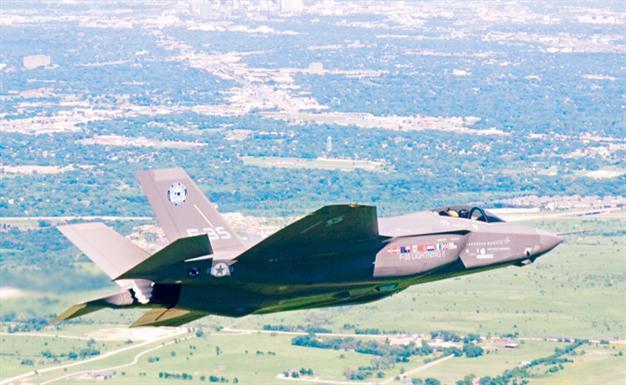Japan may cancel F-35 accord
TOKYO - Reuters

Flags of several countries that take part in
Lockheed Martin’s F-35 program are seen on a fighter jet are seen in this file photo. Japan says it may withdraw from adding its flag to the group of buyers. Hürriyet photo
Japan may cancel orders for
Lockheed Martin’s F-35 fighter jets in the case of a price rise or delivery delay, Defense Minister Naoki Tanaka said yesterday, putting Tokyo’s choice of next-generation combat aircraft in doubt.
Tokyo has warned Washington against increasing the price, but this was the first time Tanaka had raised the possibility of cancelling the order in public.
The Pentagon this month confirmed plans to put off orders for 179 F-35s over the next five years to save $15.1 billion, a move that a Lockheed executive said would increase the price of the radar-evading
warplane.
Japan is due to pay 9.9 billion yen ($122.96 million) per fighter for an initial batch of four that are scheduled for delivery by March 2017. Japan plans to buy 42 in total.
Tokyo eased a decades-old self-imposed ban on arms exports by the end of last year, paving the way for Japanese firms to participate in multinational weapons projects.
“As for the first four planes, I expect an official contract to be concluded by this summer. If it turns out they cannot meet what they have proposed by that time, that would raise concerns about our defense capability,” Tanaka told parliament.
“I believe we would need to consider as a potential option matters like cancelling our orders and starting a new selection process if that is the case.”
Japan, which is concerned about China’s rapid military buildup and constant threats from impoverished North Korea, in December chose the F-35 over combat-proven but less stealthy rivals.
The F-35 competed against Boeing’s F/A-18 and the Eurofighter Typhoon, made by a consortium of European companies including BAE Systems.
Lockheed Martin has said it is committed to providing F-35s that meet the cost, schedule and industrial requirements of the Japanese government, but added that F-35 pricing is determined by talks between the Japanese and U.S. governments.
Japan’s defense budget has been under pressure with the country saddled by a public debt twice the size of its economy.
International partners to the F-35 project are reconsidering their orders. Canada has called a March 2 meeting of officials from the partner nations, which include Turkey, Britain, Australia, Denmark, Italy, the Netherlands and Norway in Washington.
However, Turkey is sticking to plans to buy 100 F-35 fighter jets for $16 billion, with an initial order of two planes for delivery in 2015, Defence Minister İsmet Yılmaz said earlier last week, amid concerns about the project’s delays and rising costs.
“Abandoning the planes’ purchase is not being considered currently,” Turkish Defence Minister Ismet Yilmaz said in a written answer to a question from an opposition lawmaker, a copy of which was obtained by Reuters.
“In the first stage, orders will be given for two F-35 planes. Turkey plans in total to buy 100 F-35 warplanes,” the minister said.
“As of today the total amount which will be paid under the project is envisaged to be around $16 billion,” he added.
f35, joint strike fighter,
